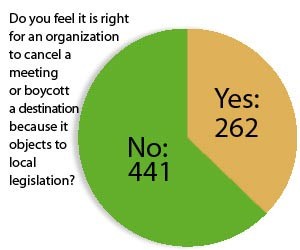How do Meetings Media readers feel about boycotting? According to a recent poll of our readers, which elicited 708 often heated responses, a majority does not believe boycotting a destination over political issues is a good idea. However, a fairly sizable minority—over a third—believe there are times when boycotting is justified.
When asked if it is right for an organization to cancel a meeting or boycott a destination because it objects to local legislation, 37 percent of the respondents agreed, while 63 percent disagreed.
When asked if a legislative issue had ever affected a choice of a meetings site, 20 percent of the respondents said it had, while the remaining 80 percent said it had not.
A third question gave respondents the chance to voice their opinions pro and con about boycotting. Here are a few of their comments:
“It hurts all the wrong people, and therefore I don’t agree with it. I live in
Arizona, I OBJECT to the new law as do many. But cutting off the livelihood of Arizonans hurts all of us, whether we are for it or opposed to it. It’s not hurting Jan Brewer or the legislators that created it, if anything it’s doing exactly what they wanted it to do…create attention.”
“I think this kind of pressure will cause businesses and municipalities to pressure the state legislature to overturn this policy.”
“It’s ridiculous. If all these ‘holier than thou’ judgmental people could read, they would see that the federal law is more prone to profiling that the Arizona law. Stop hurting the citizens of beautiful meeting locations because you don’t agree with some politician.”
“Our elected leadership is generally not in favor of using meeting venues as an organizational statement about a social or political issue. However, our leadership sees the Arizona law regarding identity papers to be a different situation. That is because it presents a danger to individual members of our diverse discipline who live in and travel to Arizona. Therefore, while we do not support a ‘boycott,’ we have made a public statement that we will not hold a meeting and jeopardize our members’ safety until this law is no longer in effect.”
“It punishes businesses, bellmen, servers, housekeepers—the wrong people to go after. It does nothing to sway the opinions of lawmakers, whether they are right or misguided.”
“I fully support the boycott of Arizona. I will not organize or attend ANY meeting in Arizona, nor will we buy supplies from ANY business in Arizona.”
“STUPID is the first word that comes to mind. I don’t understand why any organization would boycott Arizona for trying to uphold the law. If anything, organizations should be flocking to Arizona. I would not support any of those organizations who have changed their meetings sites at all.”
“Independent of my personal opinion, as with all business, we must listen to our customers/event organizers/attendees. They will actually determine how we must respond. If enough of them feel this is an appropriate response to offensive legislation, or any other issue, they will vote with their attendance and checkbooks.”
“We are very disappointed by it. We are managing a charity golf tournament for a nonprofit organization slated to go to Arizona in the fall. However, when the immigration legislation passed, the nonprofit lost 95 percent of its sponsors who had committed to support the event and 50 percent of the players cancelled. Now, the nonprofit has no choice but to postpone it and are stuck with multiple attrition fees that are unrealistic. But with no players and no sponsors who state emphatically that they will not support the event if held in Arizona, what can they do but postpone or cancel and take the heat?”
“As a not-for-profit based in Arizona we have been directly affected by the situation. Our meeting, which is taking place in Tucson next week, has already received cancelations from people concerned with the legislation. We understand their concern; however, they are not hurting the legislators that implemented this bill, they are hurting us, the nonprofit that's already having difficulty scraping by in this down economy.”



